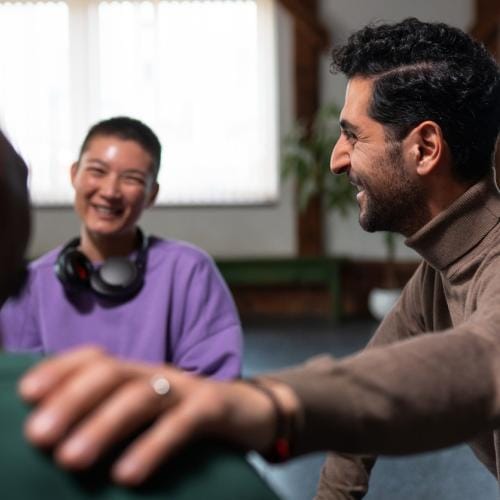Why we dream big but struggle with small acts

"Everybody wants to save the Earth but nobody wants to help Mom do the dishes."
–P. J. O'Rourke, All The Trouble in The World
When I first read this quote, I remember laughing. But it kept echoing because of how blatantly honest it was. Truly, who among us doesn't want to be a big hero that will change the world forever? But when it comes to doing small, unglamorous tasks within our capability, we hesitate. We often ignore the simple, immediate things that actually make life better.
I often wonder why we are drawn to grand dreams yet reluctant to perform small acts. Maybe our imagination is clean and smooth when real life is not. It's much easier to imagine saving the planet in some far-distant future that might not exist. But to face the discomfort of doing something small and immediate? That's where we put our foot down. It's easier (and much more fun to be honest) to dream of a better world than to deal with the small tensions we face in our day to day lives.
We glorify dramatic hypothetical heroism (which is most unlikely to happen) while overlooking the everyday decency of simply treating people well.
Recently, I was talking to a girl whose friend treats her horribly on a regular basis. But she was still friends with him. When I asked her why she replied "Because I know, he will sacrifice his life for me." The conversation stopped there but the sentence lingered. It made me realise how deeply we glorify dramatic hypothetical heroism (which is most unlikely to happen) while overlooking the everyday decency of simply treating people well.

We love the "idea" of being heroes. In our heads we love to imagine that in some great moment of crisis, we'll save someone, we'll do something heroic and then we'll be remembered forever. But unfortunately, people don't reward others for everyday goodness. It doesn't come with proclamations. It comes with the humility to do what's necessary, even when no one's watching.
Dostoevsky says, "Love in action is a harsh and dreadful thing compared to love in dreams." We all are selfless lovers in our dreams. We "imagine" ourselves kind, forgiving, and brave. But love in action is where our imagination collapses. It requires consistency not drama. It means forgiving someone who won't say sorry, calling your mother even when you're tired.
It is so easy to love humanity than it is to love humans. Real people are inconvenient. They need patience instead of loud slogans. They disappoint, they argue, they test our limits. Helping them doesn't feel heroic. It feels ordinary, mostly frustrating. But that's where the real work of goodness happens, in the places too "un-grand" for headlines.
The older I get, the more I believe that morality doesn't begin in revolutions. It begins in small rooms, in how we treat people when it doesn't benefit us. It begins with whether we notice when someone's quietly upset, spending time with parents even when you are busy or listening to your friend's break up story for the 100th time. The truth is, we cannot change the world if we cannot even be kind and generous with the people closest to us.
O'Rourke's line about dishes is a metaphor for the tendency present in all of us. The tendency to outsource goodness to grand ideas while ignoring its practice in daily life. We love saving the Earth because "the Earth" is a concept, it doesn't talk back, and doesn't require humility. But Mom does. The neighbour does. The friend we keep ignoring does.
It is so easy to love humanity than it is to love humans. Real people are inconvenient. They need patience instead of loud slogans. They disappoint, they argue, they test our limits. Helping them doesn't feel heroic. It feels ordinary, mostly frustrating. But that's where the real work of goodness happens, in the places too "un-grand" for headlines.

I think of how often we confuse ideals for integrity. We post about justice but ignore the person sitting beside us who feels unheard. We talk about mental health but make jokes that tear someone's confidence apart. We say "be kind," but only when kindness costs us nothing. We claim we'd "die for our friends," but rarely do we live for them, which means showing up, being patient, helping them change instead of judging.
Real change doesn't look cinematic. It looks like staying calm when you want to fight. It looks like staying a little late at your friends' house to help clean her up. It can even look like simply cleaning up after yourself. Maybe the real hero is the one who truly listens. They are the ones who do the unremarkable things that keep love and human relationships going. We love to dream of sacrificing our life for others, but do we ever truly live for each other? The real change must begin there, in the small acts of kindness that keeps the world from falling apart. The world has enough saviours, it needs more people willing to help each other.

The grand gestures mean little if we can't even manage the simple ones. The world is full of people who would sacrifice everything for a cause but won't sacrifice a bit of ego in a conversation. We are all guilty of wanting to be the hero in our own story, instead of being a good presence in someone else's. Perhaps saving the Earth really does start with helping Mom do the dishes. Because dishes are real. They remind us that care is not an idea, it's a practice. The person who helps with the dishes today will help build the world tomorrow through action instead of fantasy.
We should start with what's within our reach. We should do the "doable" acts of goodness first, instead of chasing some grand abstract ideals. Before we dream of saving the whole wide world and the entire humanity, let's start by just being decent human beings. We can change the world, with one small act at a time.
Sazida Nahrin Auhona is an undergrad student who lives somewhere between art, literature and philosophy.
Send your articles for Slow Reads to slowreads@thedailystar.net. Check out our submission guidelines for details.



 For all latest news, follow The Daily Star's Google News channel.
For all latest news, follow The Daily Star's Google News channel.
Comments